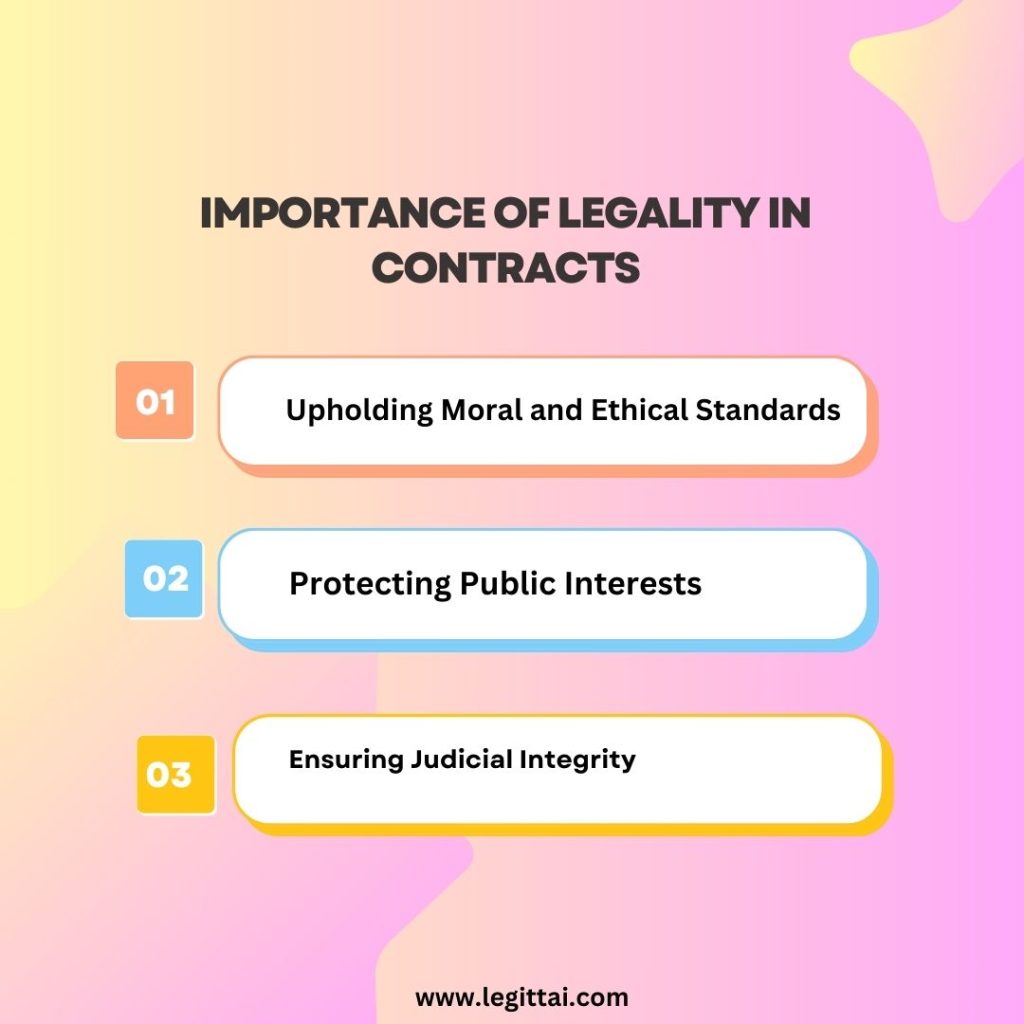In the world of business and personal agreements, contracts act as the backbone of transactions and relationships. However, a contract, regardless of how well-drafted it may be, stands on shaky ground if it lacks a legal purpose. This article delves into the concept of the legality of purpose in contract law, its importance in ensuring a contract’s enforceability, and practical tips for individuals and businesses to secure their agreements.
What is Legality of Purpose in Contract Law?
Legality of purpose refers to the requirement that the subject matter of the contract must be legal and not against public policy. This fundamental principle is rooted in the notion that the law should not be used to enforce agreements that involve illegal activities or objectives that are considered harmful to society.
Legality of Purpose: Key Principles
- Illegality of Subject Matter: If the primary objective of a contract is to achieve an outcome that violates the law, such as selling banned substances or engaging in fraudulent activities, the contract is inherently void and unenforceable.
- Violation of Public Policy: Contracts that, while not illegal, go against societal norms or public welfare, such as agreements promoting discrimination or exploitation, are also considered void.
Importance of Legality in Contracts
The legality of purpose serves several vital functions in the realm of contract law:

- Upholding Moral and Ethical Standards: It ensures that business and personal conduct adheres to societal moral and ethical standards.
- Protecting Public Interests: By invalidating contracts with harmful objectives, it safeguards public interests and welfare.
- Ensuring Judicial Integrity: Courts avoid being implicated in enforcing unethical or harmful agreements, maintaining the integrity of the judicial system.
Examples of Contracts with Illegal Purposes
To understand the concept better, consider the following examples:
- A Contract for Illegal Drug Trade: A written agreement to buy and sell substances prohibited by law would be unenforceable.
- Agreements to Commit Fraud: Contracts that involve deceiving others or misrepresenting facts for personal gain are void.
- Contracts that Promote Discrimination: Agreements that involve discriminatory practices, whether in hiring, service provision, or any other area, are against public policy and unenforceable.
Ensuring Legality in Contract Drafting
When drafting or entering into a contract, several steps can be taken to ensure legality:
- Understand the Law: Be aware of the legal context surrounding the contract’s subject matter. This includes understanding both statutory laws and case laws relevant to the contract’s purpose.
- Seek Legal Counsel: Consult with legal professionals to ensure that the contract’s terms and its purpose comply with the law.
- Clarity and Specificity: Clearly outline the contract’s purpose and ensure that it is specific enough to avoid any illegal interpretation.
- Regular Review and Updates: Laws and public policies evolve. Regularly reviewing and updating contracts can help ensure ongoing compliance.
Challenges in Determining the Legality of Purpose
Determining whether a contract’s purpose is legal can sometimes be challenging:
- Grey Areas in Law: Some areas of law are not black and white, making it difficult to assess the legality of certain contracts.
- Evolving Public Policy: As societal norms change, what is considered against public policy can shift, potentially impacting existing contracts.
- Jurisdictional Variations: Laws and public policies can vary significantly between jurisdictions, complicating cross-border contracts.
Case Studies
Case Study 1: Employment Contract with Non-Compete Clause
In many jurisdictions, non-compete clauses in employment contracts are subject to strict scrutiny. If the terms are overly restrictive, such as unreasonably long time frames or geographical areas, courts may deem them as against public policy and therefore unenforceable.
Case Study 2: Environmentally Harmful Agreements
Contracts that involve activities harmful to the environment, such as illegal dumping of waste, can be voided not only for breaking environmental laws but also for being against public policy regarding environmental protection.

The legality of purpose in contracts is a cornerstone of contract law, ensuring that agreements adhere to legal and ethical standards. Whether for businesses or individuals, understanding and adhering to this principle is crucial in securing enforceable contracts. Regular consultation with legal professionals, staying informed about changes in law and public policy, and drafting clear, specific contracts are key steps in safeguarding the legality and enforceability of agreements. As laws and societal norms evolve, so does the interpretation of what constitutes a legal purpose in contracts, making continuous vigilance and adaptation a necessity in contract management.
Did you find this Legitt article worthwhile? More engaging blogs about smart contracts on the blockchain, contract management software and electronic signatures can be found in the Legitt Blogs section. You may also contact Legitt to hire the best contract lifecycle management services and solutions.
FAQs on Legality of Purpose
What is the significance of the Legality of Purpose in contracts?
The Legality of Purpose ensures contracts align with legal and ethical standards, making them enforceable and protecting parties involved from legal ramifications.
How does compliance with the law affect contract validity?
Contracts mandating illegal activities violate legal standards, rendering them unenforceable and potentially subjecting parties to legal consequences.
Why is alignment with public policy crucial in contracts?
Contracts conflicting with societal norms or public welfare can be deemed unenforceable due to their adverse impact on public interest.
What constitutes fraudulent intent in contract formation?
Fraudulent intent encompasses actions like concealment, misrepresentation, or exploitation aimed at deceiving the other party, invalidating the contract.
What are the repercussions of illegal contracts?
Illegal contracts can lead to financial losses, reputational damage, and wasted legal proceedings, impacting both parties involved.
How can individuals safeguard against illegal contracts?
Seeking legal counsel, using clear language, full disclosure, and compliance with formalities help ensure contract legality and enforceability.
Can contracts be legally sound without compliance with public policy?
No, contracts must align with public policy to be enforceable, as agreements against public welfare or societal norms are void.
What examples illustrate illegal contracts?
Contracts involving stolen goods, non-disclosure of safety hazards, or discriminatory practices violate legal standards and are unenforceable.
What role does fraudulent intent play in contract formation?
Fraudulent intent undermines the validity of contracts, as actions like concealment, misrepresentation, or exploitation taint the agreement's integrity.
Why is it essential to understand the legality of purpose in contracts?
Understanding the legality of purpose helps parties craft enforceable contracts, protecting their interests and ensuring compliance with legal and ethical standards.
